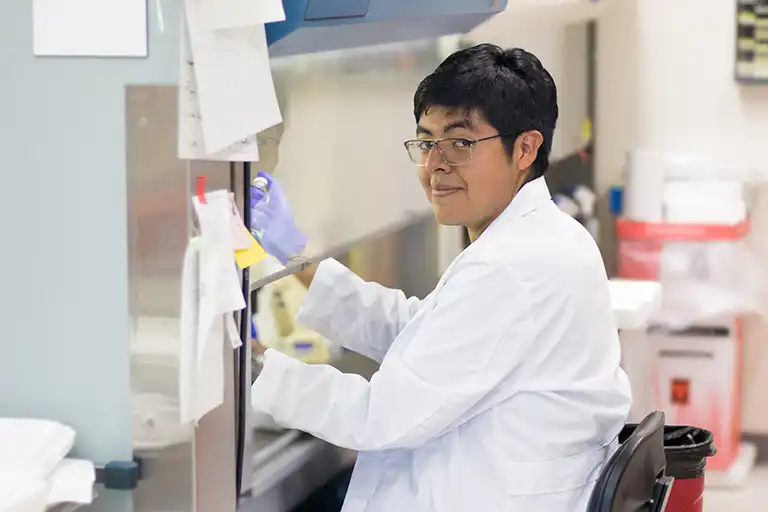Name: Uziel Rivera-Lopez
School: IU Bloomington, rising junior
Hometown: Indianapolis
Summer program: Diversity in Cancer Research (DICR), supported by the American Cancer Society
Summer mentor: Attaya Suvannasankha, MD
Career aspirations: Obtain a PhD in artificial intelligence
Why were you interested in participating in this program?
My major is computer science with a specialization in AI – which on paper may not make sense why I’m doing this – but I want to mold my specialization to focus on the medical field. Originally, I wanted to do something in medicine or research, and I still want to continue working in this field. For me to understand how to incorporate AI into medicine, I need to learn the lab protocols, data analysis and much more. What better way to learn that than through this program.
What is one thing you have learned this summer?
Doing a Western blot was something new I had never done before. It was close to doing gel electrophoresis, but not since there was a lot more preparation that had to happen before you could run it and see your results. Also, there are two different ways to view the results of the blot. You can use the BioRad ChemiDoc machine or by film which I personally enjoy doing the film a lot more.
What has surprised you about the experience?
The amount of technology used to measure and capture data. In some machines around the lab, you insert a mixture, and you get readings and graphs made for you. There's even software you can use to have the computer detect bands for you and give you some readings. What machine learning model does it use to be able to detect that? Honestly, I'm pretty impressed with the technology in research and hope to learn more about it in my classes.
Tell us about a particularly interesting day or experience you’ve had in the program. Anything especially memorable?
As you can probably tell, I love technology. One day, one of my lab colleagues came in and told me that there was some issue that he thought I could help with, which gave me a clue it could be something tech-related. I walked with him to a lecture hall, and I realized it was an issue with the presentation not showing up on the projectors. I have never messed around with a Crestron, so I was a little worried because I had barely any knowledge of it. On the spot, I learned how to use it, and I realized what I needed to do and got it up and running. So, you're not just a research intern, you could also be tech support around here!
Do you have advice for future summer program participants?
The one thing, when I started, was the amount of information I needed to read to catch up to the project, especially when I found out how far back this project started. I would say: Don’t fear all the information you have to read. Sure, it might be 10+ years of research, but your team will help you get into the motion of where we are. Once you follow that motion, it will feel like you know everything and at the same time learn something new about your project—or the people you get to work with!
Anything else you want to share?
I really enjoyed working with Dr. Suvannasankha and her team. We had good days where results came in beautifully and bad days where there were no results when we ran experiments, or on our data. Yet, we managed to find a solution to our problems. I really am going to miss working in this program and the team.





